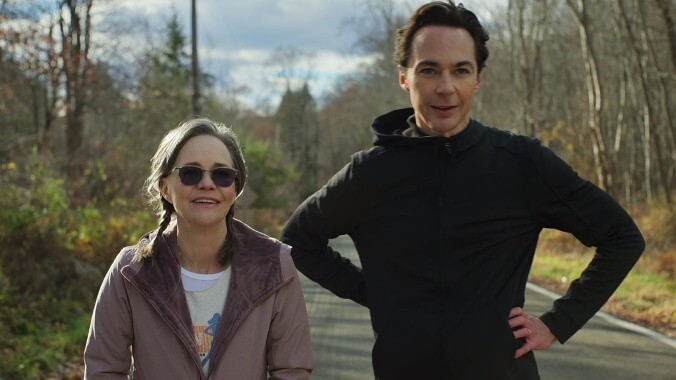Spoiler Alert tries too hard to distance itself from the tragedy at its center
In Spoiler Alert, the hero dies—but the Jim Parsons-Sally Field film undercuts the emotional impact of its inevitable conclusion every chance it gets

To say grief comes in many forms is such an overwrought understatement that to trot it out at the start of a review feels like a cop-out. And yet Spoiler Alert, based on Michael Ausiello’s memoir by the same name (with the added clarification: The Hero Dies), made me think about the ways in which we cope with grief. Not just the grief over losing a loved one—which this film is very squarely about—but about the grief of losing parts of yourself whenever you’re in a long-term relationship. Or the grief of having said goodbye to how others once saw you as.
Grief, this tender-hearted tearjerker of a film seems to suggest, is an integral part of queer life. There’s no way of escaping its trappings even when you’ve successfully (or so you thought) built a life for yourself with a partner who loves you. The “yourself” in that sentence is Michael (Jim Parsons), a TV blogger/writer who seems to hit the jackpot when he meets Christopher “Kit” Cowan (Ben Aldridge, in what should be a star-making leading role). The two, in true Hollywood meet-cute style worthy of the film’s romcom-skewing first half, fall for one another despite obvious red flags. And then, more than a decade later, when a cancer diagnosis threatens to disrupt what was already quite a precarious relationship between Michael and his boyfriend Kit, it proves that sometimes all you need is love.
If such a premise sounds all too cloying, you should know that in that sense, Spoiler Alert is, in many ways, familiar and novel in equal measure. After all, since the 1980s, queer and straight filmmakers alike have been telling stories about romances interrupted and lives shortchanged due to illness. Yet, in telling a cancer story (rather than an HIV/AIDS one), the film sets itself apart from that cinematic lineage all the while joining a similarly robust one. And director Michael Showalter makes no attempt to disguise such a lineage. During a scene where Michael is tasked with “de-gaying” Kit’s apartment, we see a DVD of Beaches—the film where a pair of friends learn they’re one another’s wind beneath their wings—falling over a shelf before he scoops it up. Later, Michael himself channels Shirley MacLaine’s Oscar-winning turn in the tearjerker cancer drama Terms Of Endearment as he demands his husband (shush, it sounded more dramatic that way!) be! given! a! bed!
It’s in that familiarity that this adaptation thrives, achieving that “normalcy” American audiences so often clamor for when talking about contemporary LGBTQ cinema. Here is, after all, a “normal” couple tackling an unspeakable tragedy in slow motion in ways many others have before. And within that template, David Marshall Grant and Dan Savage’s script sneaks in often quite nuanced takes on gay male intimacy and the scars the closet has taken on these two otherwise well-adjusted gay professionals. Even the quiet moments Kit shares with his parents (played by the luminous Sally Field and the always-game Bill Irwin) are lovely and grounded, allowing us to witness the way in which Michael and Kit’s long-term partnership had turned them into a family.










![HBO teases new Euphoria, Larry David, and much more in 2026 sizzle reel [Updated]](https://img.pastemagazine.com/wp-content/avuploads/2025/12/12100344/MixCollage-12-Dec-2025-09-56-AM-9137.jpg)





























